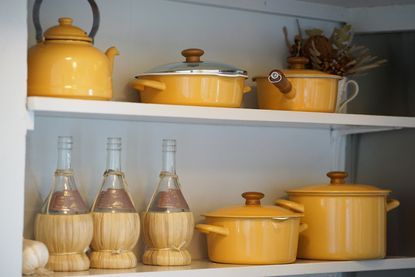How to care for your cast iron cookware so that it lasts forever – 7 rules every owner should know
Cast iron cookware may be costly but it will last you a lifetime if you care for it properly


A selection of cast iron cookware is the marker of a seriously stylish kitchen. For the more culinary inclined, owning a matching set of these durable pans is the stuff of dreams, and they can really bring a kitchen to life from a design perspective, too. The only slight inconvenience, however, is that they can be notoriously tricky to care for.
Introducing cast iron cookware into your modern kitchen comes at a cost, but for good reason. As the most durable type of kitchenware out there, a set of cast iron pans could last you your whole lifetime - if you know how to treat them properly, that is. Compared to your standard aluminum or stainless steel pots and pans, there are a few extra pointers you need to know about when it comes to looking after your cast iron, and there are some common mistakes first-time owners always make.
Whether you've just invested in your first Dutch oven or you're just curious to know if you've been caring for your existing one properly after all these years, we've asked some experts how to care for cast iron cookware if you really want it to stand the test of time. Here are seven rules you need to know.
1. Season regularly

For keen kitchen owners there's nothing more exciting than christening your new cast iron pot with that first meal, but many of us are hesitant to get started due to concerns about seasoning them. The good news is that most cast iron skillets and pans come pre-seasoned these days, although you may want to season your cookware regularly over time as the seasoning erodes in order to prevent your food from sticking to your pots or pans.
'I always recommend seasoning cast iron pans regularly as it builds up a natural nonstick coating,' explains Dennis Littley food blogger at Ask Chef Dennis. 'After cleaning, rub a thin layer of oil into the pan and bake it for an hour at 100°C. This polymerizes the oil, protects the iron, and gradually seasons the cookware.' A neutral oil with a high smoke point such as vegetable oil or canola oil is usually best.
2. Always dry thoroughly
You might be used to leaving your pans to drain on a drying rack next to the kitchen sink or leaving them in the dishwasher until the next use, but when it comes to cast iron cookware, it's important you always dry your equipment thoroughly to prevent rust. That means you should never leave it to air dry, especially if you've used soap or some form of detergent.
If your laziness has got the better of you and you don't want to use a dishcloth to dry your utensils, Peter Lipson of Kitchenda has a great hack up his sleeve. 'After cleaning, place the pan in the oven on low heat,' he says. This will ensure your pan is bone dry ready for your next use.
3. Avoid sudden temperature changes

There are some other rules to remember when it comes to washing up your cast iron, too. 'Try to avoid sudden temperature changes when dealing with your cast iron pans as going from very hot to cold can damage the cookware,' explains Dennis 'Don't put a hot cast iron pan in cold water and always let it cool gradually before cleaning because sudden shifts in temperature can cause the metal to crack or warp.'
The team at Le Creuset agrees that you should always allow your pan to cool before washing. 'It will also be much easier to clean and will keep your pan sparkling,' they add. If you're wondering if you should invest in cast iron cookware the answer is certainly yes, but you need to ensure you take these extra precautions to keep it working at its full potential.
4. Never use metal utensils
To avoid removing the seasoning or damaging the enamel inside your skillet, pan, or Dutch oven, make sure you never use metal utensils while cooking. That goes for spatulas, knives, tongs, and even balloon whisks. Think of it in the same way you'd avoid scratching the non-stick coating from a Tefal pan. 'Use wooden or silicone utensils instead,' says Peter. 'Metal will slowly remove the seasoning.'
5. Steer clear of heavy oils

When cooking with cast iron, it's always best to choose a lighter oil and avoid heavier types such as olive oil. This is because the likes of rapeseed or sunflower oil have a higher smoke point, while oils with a low smoke point can leave a residue on the bottom of the pan.
According to Dennis, you should also avoid being too heavy-handed when pouring your oil and cook with a thinner layer in most cases. 'This oil then gets absorbed into the seasoning layer so only a small amount is needed,' he says. 'However, using too little oil can damage the seasoning over time.'
6. Don't soak cast iron
Cast iron cookware might look right at home in a rustic farmhouse kitchen, but only if it's not totally worn and rusted. Soaking pans - especially Dutch ovens - is a common mistake many cast iron cookware owners make, but in order to avoid rust, you should never leave your cast iron in water.
'Soaking for too long as soaking can strip away the seasoning,' says Dennis. 'Gently scrub with a brush and hot water and towel dry thoroughly afterward to prevent rusting. You should also avoid harsh soaps or scouring pads too as this can affect the coating.' Ideally, you should handwash your cast iron cookware to ensure its longevity.
7. Always store cast iron pans properly
'Always store your cast iron cookware properly as leftover moisture can rust the pan,' Dennis adds. 'Rub with a thin coat of oil after drying and store in a dry spot. You could also place a paper towel inside the pan while storing it to absorb any moisture.'
Dennis also avoids stacking your cast iron cookware. 'Stacking pans together can chip the seasoning layers so stack cast iron pans individually with paper towels between them,' he says. We love these pan protectors from Amazon that easily slot into your pot, no matter the size.
'Our top tip on how to store Le Creuset cast iron is to keep the clips that come with the product when purchased - it is a great hack for stacking,' explains a spokesperson from Le Creuset. 'These enable you to efficiently store them by placing the lid upside down and stacking your pot on the lid while protecting them.'
Investing in cast iron cookware is certainly a worthy spend, but you'll need to be prepared to take these precautions. Follow these simple steps and your cast iron cookware will last you a lifetime.

Price: $449.99
Color: Flame

Price: $19.99
Brand: Lodge Enamel

Price: $229
Color: Camogreen
Be The First To Know
The Livingetc newsletter is your shortcut to the now and the next in home design. Subscribe today to receive a stunning free 200-page book of the best homes from around the world.

Lilith Hudson is the News Editor at Livingetc, and an expert at decoding trends and reporting on them as they happen. Writing news, features, and explainers for our digital platform, she's the go-to person for all the latest micro-trends, interior hacks, and color inspiration you need in your home. Lilith discovered a love for lifestyle journalism during her BA in English and Philosophy at the University of Nottingham where she spent more time writing for her student magazine than she did studying. After graduating, she decided to take things a step further and now holds an MA in Magazine Journalism from City, University of London, with previous experience at the Saturday Times Magazine, Evening Standard, DJ Mag, and The Simple Things Magazine. At weekends you'll find her renovating a tiny one-up, one-down annex next to her Dad's holiday cottage in the Derbyshire dales where she applies all the latest design ideas she's picked up through the week.
-
 How to Make a White Bathroom Feel Warm — 5 Tricks Designers Use For a Cozier and More Restful Spaces
How to Make a White Bathroom Feel Warm — 5 Tricks Designers Use For a Cozier and More Restful SpacesGive your all-white bathroom a glow-up with these tips for bringing warmth to the space
By Oonagh Turner Published
-
 5 Habits to Adopt That Will Make Your Home Smell Good All the Time — 'Add Them to Your Routine Today!'
5 Habits to Adopt That Will Make Your Home Smell Good All the Time — 'Add Them to Your Routine Today!'Incorporating these tricks into your maintenance routine will keep every corner of your home smelling fresh and welcoming
By Katie Baxter Published

